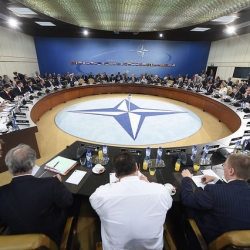Why the U.S. Should Not Arm Ukraine Right Now
Why the U.S. Should Not Arm Ukraine Right Now March 6, 2015 Today, members of Congress and outside voices are continuing the push to send lethal aid to Kiev. These calls are ill-timed, especially while a tenuous ceasefire seems to have taken hold pursuant to the Minsk II agreement reached last month between European powers, Ukraine, and Russia. While the future of the ceasefire remains very much in doubt, a decision to send arms to Kiev now would carry more cost than benefits, undermining rather than protecting U.S. and European interests. Top costs include inducing Russian escalation, giving Putin political cover to violate the ceasefire, and undermining transatlantic unity in confronting Moscow’s aggression. Despite these costs, American arms will not empower Kiev to successfully resist… Read More ›




